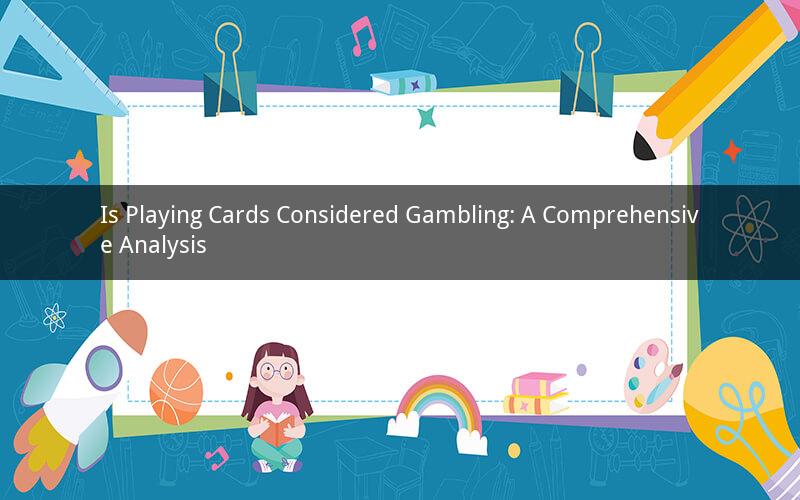
Playing cards have been a popular form of entertainment for centuries. From children's games to sophisticated card games, the deck of cards has been a staple in many cultures. However, the question of whether playing cards is considered gambling has sparked debates among enthusiasts and legal authorities alike. In this article, we will delve into the intricacies of this topic, exploring the definitions of gambling, the nature of playing card games, and the legal implications surrounding them.
Defining Gambling
To determine whether playing cards is considered gambling, it is essential to first understand the definition of gambling. According to the Merriam-Webster dictionary, gambling is "the act of playing a game involving chance for money or other stakes." This definition encompasses several key elements: a game, chance, and stakes.
A Game
Playing cards, by their very nature, are a game. They are designed for entertainment and can be used to play a wide variety of games, such as poker, bridge, rummy, and solitaire. The presence of a game component is a crucial factor in determining whether playing cards are considered gambling.
Chance
The element of chance is another essential aspect of gambling. In playing card games, the outcome of the game is often determined by the luck of the draw. While skill and strategy may play a role in some games, the element of chance is still present. This raises the question of whether playing cards, which involve chance, can be classified as gambling.
Stakes
The final element of gambling is stakes. Stakes refer to the money or other valuable items that are wagered on the outcome of the game. In many card games, players may bet on the outcome of the hand, the game, or even the entire session. The presence of stakes is a significant factor in determining whether playing cards are considered gambling.
The Nature of Playing Card Games
Playing card games can range from simple, casual games to complex, competitive games. The nature of the game itself can influence whether it is considered gambling. Here are some key factors to consider:
1. Skill vs. Chance: In some card games, such as poker and bridge, skill plays a significant role in determining the outcome. In these games, players must use strategy, bluffing, and knowledge of the game to win. On the other hand, games like solitaire and Go Fish rely more on chance and luck.
2. Social Aspect: Many card games are played socially, with friends and family gathering to enjoy the game. The primary focus of these games is often entertainment and social interaction, rather than winning money.
3. Organized Games: In some cases, card games may be organized and played for money, such as in casinos or poker tournaments. These organized games often have specific rules and regulations that govern the play.
Legal Implications
The legal status of playing cards as gambling varies by country and even by state or region within a country. Here are some key considerations:
1. Legal Definitions: Different jurisdictions have different definitions of gambling. Some may consider any game involving chance and stakes as gambling, while others may require additional elements, such as organized betting or professional gambling.
2. Social Gambling: In many places, social gambling is permitted, where friends and family play for fun and no money is exchanged. However, when money is involved, the legal status may change.
3. Professional Gambling: Professional gambling, such as operating a casino or running a poker tournament, is often strictly regulated and requires a license or permit.
Frequently Asked Questions
1. Q: Can playing cards be considered gambling if no money is involved?
A: It depends on the jurisdiction and the nature of the game. In some places, any game involving chance and stakes, even without money, may be considered gambling.
2. Q: Is playing cards for fun, without any betting, considered gambling?
A: Generally, no. Playing cards for entertainment and social interaction without any betting is not considered gambling.
3. Q: Can playing cards be considered gambling if the stakes are low?
A: The stakes themselves do not determine whether playing cards is considered gambling. The key factors are the presence of a game, chance, and stakes.
4. Q: Is online playing card gaming considered gambling?
A: The legal status of online playing card gaming varies by jurisdiction. In some places, it is considered gambling, while in others, it is not.
5. Q: Can playing cards be considered gambling if the game is played in a private home?
A: The legal status of playing cards in a private home depends on the jurisdiction and the nature of the game. In some places, social gambling in a private home is permitted, while in others, it is not.
In conclusion, whether playing cards is considered gambling is a complex issue that depends on various factors, including the definition of gambling, the nature of the game, and the legal implications. While playing cards are a popular form of entertainment, their classification as gambling can vary significantly depending on the circumstances.